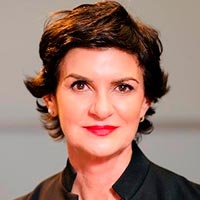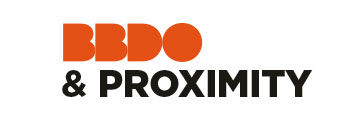Master’s Degree in Marketing and Digital Advertising
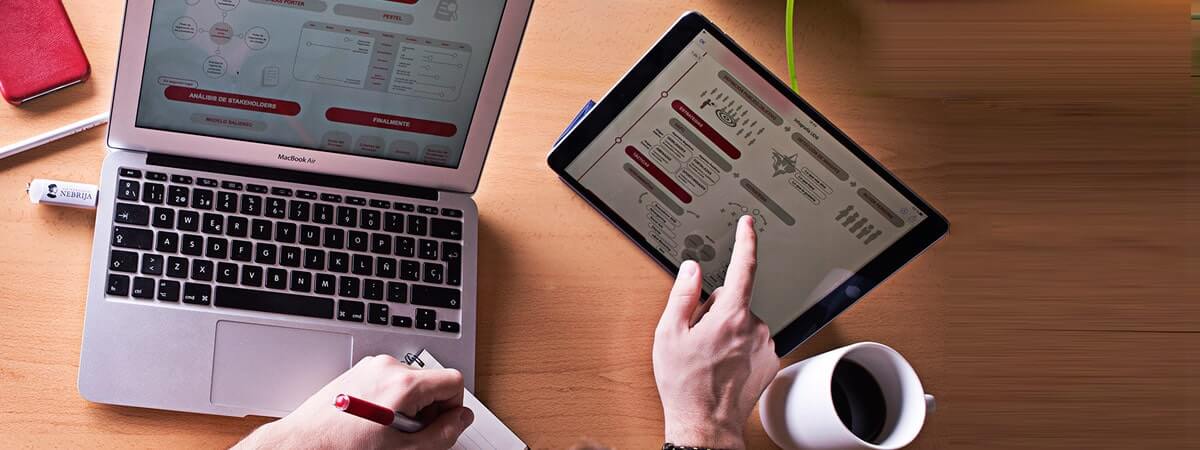
Learn the digital marketing process in a comprehensive way
The Master's Degree in Digital Marketing and Advertising trains professionals specialized in online marketing, digital advertising and communication, so that they are capable of making strategic and tactical decisions in this market, irrevocably online.
This program, which is taught 100% online, allows students to combine their professional and academic activities without having to travel to the university. Examinations are carried out through the Virtual Campus, as well as the presentations, submission of assignments and even the final defense of the Master's Final Research Project.
The program, which has an employability index of 94% of the graduates, has an internship program in companies that adapts to the personal and professional circumstances of the student.
The structure of the course is oriented so that the student can reconstruct the entire process of online communication and marketing in an integral way: definition of objectives, strategies for the creation of a corporate or commercial website, and development and planning of campaigns.
Thus, the student acquires skills in essential areas such as web analytics, search engine positioning (SEO/SEM), social media management, customer relationship management, mobile marketing, creativity and web design, web architecture and e-commerce. The training program includes learning digital marketing tools such as Hootsuite, Wordpress, Comscore, SocialBakers, Sketch and Figma, among others.
In addition, this official master's degree offers the basic preparation to pass the Google Analytics and Google Adwords certification exams, internationally recognized degrees.
The program has a professional focus aimed at acquiring the advanced knowledge, tools, abilities and skills necessary to successfully carry out the work of marketing and advertising experts in the digital environment. All the professors have accredited professional experience in their teaching area.
In this line of education, the Master's Final Research Project consists of carrying out a complete digital communication plan where the student will have the opportunity to apply the knowledge and skills acquired during the course to a practical case, for which specific lectures will be given, and they will have the personalized assistance of a tutor.
Prestigious program in 100% Online mode, with 95% employability
Program with 95% employability
Curriculum
BOE No.6 January 7th 2012
All our degrees and curricula have been prepared in accordance with the new guidelines set by current legislation, having already been verified by the National Agency for Quality Assessment.
The student must complete 60 credits
First Semester 24 ECTS
- 4 ECTS | Online Marketing
- 4 ECTS | Web Architecture
- 4 ECTS | Digital Advertising
- 4 ECTS | Search Engine Optimization: SEO and SEM
- 4 ECTS | Social Media and Content Management
- 2 ECTS | ICT Tools
- 2 ECTS | Web Measurement and Analytics
Second Semester 36 ECTS
- 4 ECTS | Electronic commerce
- 2 ECTS | Mobile Marketing and New Online Trends
- 2 ECTS | Digital Design and Creativity
- 4 ECTS | CRM, Consumer Research and Online Reputation
- 4 ECTS | E-Marketing Strategy and Online Media Planning
- 2 ECTS | Legal Framework, Regulation and Professional Ethics
- 2 ECTS | Affiliate Marketing
- 2 ECTS | Webinar on Analytics in Social Media
- 4 ECTS | External Internship
- 10 ECTS | Final Research Project
Professors
| Profesores Professors | Porcentaje de Doctores Percentage of PhD holders |
| 21 | 71% |
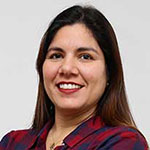 Eglée Ortega Fernández
Directora del Máster y Profesora de Marketing online
Director of the Master's Degree and Professor of Online Marketing
Doctora en Comunicación Audiovisual, Publicidad y Relaciones Públicas. Profesora Acreditada por ANECA. Especializada en las áreas de marketing digital, posicionamiento de clientes (SEO), publicidad digital (SEM), redes sociales, optimización de contenidos, nuevas audiencias, comunicación corporativa y comunicación política. Ha sido coordinadora los másteres oficiales de ID Digital School, consultora de marketing digital en la agencia Top Position, coordinadora del Gabinete de Prensa del Partido Voluntad Popular y del político venezolano Leopoldo López (2011); Jefe y asistente del gabinete de prensa en los Institutos de Policía en los distritos de Chacao y Baruta en Venezuela, desde 2005 hasta 2009; asistente del embajador y de la sección de Prensa y Cultura en la oficina de la Unión Europea en Venezuela en 2010; y actualmente, miembro de la Asociación de Periodistas Venezuelan Press.
Eglée Ortega Fernández
Directora del Máster y Profesora de Marketing online
Director of the Master's Degree and Professor of Online Marketing
Doctora en Comunicación Audiovisual, Publicidad y Relaciones Públicas. Profesora Acreditada por ANECA. Especializada en las áreas de marketing digital, posicionamiento de clientes (SEO), publicidad digital (SEM), redes sociales, optimización de contenidos, nuevas audiencias, comunicación corporativa y comunicación política. Ha sido coordinadora los másteres oficiales de ID Digital School, consultora de marketing digital en la agencia Top Position, coordinadora del Gabinete de Prensa del Partido Voluntad Popular y del político venezolano Leopoldo López (2011); Jefe y asistente del gabinete de prensa en los Institutos de Policía en los distritos de Chacao y Baruta en Venezuela, desde 2005 hasta 2009; asistente del embajador y de la sección de Prensa y Cultura en la oficina de la Unión Europea en Venezuela en 2010; y actualmente, miembro de la Asociación de Periodistas Venezuelan Press.
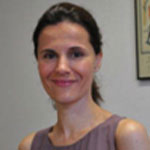 Inés María Arranz Rodríguez
Profesora de Estrategia de e-marketing y planificación de medios online
Professor of e-marketing strategy and online media planning
Directora del Máster en Dirección de Publicidad Integrada y profesora en la Facultad de Comunicación y Artes de la Universidad Nebrija, en Madrid. Doctora Cum Laude en Ciencias de la Información Universidad Complutense de Madrid. Máster Dirección Recursos Humanos. ESIC. Programa Superior en Digital Business y gestión de contenidos digitales. THE VALLEY. Curso Superior de Publicidad Digital. Icemd-Esic. Desarrolló su carrera profesional como directora de medios publicitarios durante veinte años en las agencias de medios Carat, Equumedia, Optimedia, Iceberg y SMA. Actualmente imparte docencia de las asignaturas Planificación de medios Laboratorio de Medios, Investigación de audiencias del Grado de Publicidad y RR.PP en la Universidad Nebrija y en las siguientes asignaturas de Máster: Estrategia de E-Marketing y Planificación de Medios On Line en el Máster en Marketing y Publicidad Digital. Target, puntos de contacto y gestión de medios POEM en el Máster en Dirección de Publicidad Integrada Planificación de Medios Integrada. Su línea de investigación se centra en la relación de la publicidad con los medios de comunicación.
Inés María Arranz Rodríguez
Profesora de Estrategia de e-marketing y planificación de medios online
Professor of e-marketing strategy and online media planning
Directora del Máster en Dirección de Publicidad Integrada y profesora en la Facultad de Comunicación y Artes de la Universidad Nebrija, en Madrid. Doctora Cum Laude en Ciencias de la Información Universidad Complutense de Madrid. Máster Dirección Recursos Humanos. ESIC. Programa Superior en Digital Business y gestión de contenidos digitales. THE VALLEY. Curso Superior de Publicidad Digital. Icemd-Esic. Desarrolló su carrera profesional como directora de medios publicitarios durante veinte años en las agencias de medios Carat, Equumedia, Optimedia, Iceberg y SMA. Actualmente imparte docencia de las asignaturas Planificación de medios Laboratorio de Medios, Investigación de audiencias del Grado de Publicidad y RR.PP en la Universidad Nebrija y en las siguientes asignaturas de Máster: Estrategia de E-Marketing y Planificación de Medios On Line en el Máster en Marketing y Publicidad Digital. Target, puntos de contacto y gestión de medios POEM en el Máster en Dirección de Publicidad Integrada Planificación de Medios Integrada. Su línea de investigación se centra en la relación de la publicidad con los medios de comunicación.
 Pilar Asín Loscertales
Profesora de CRM, investigador del consumidor y reputación online
Professor of CRM, consumer researcher and online reputation
Licenciada en Publicidad y Relaciones Públicas e Investigación y técnicas de Mercado por la Universidad Antonio de Nebrija. Profesora de CRM, Investigación del consumidor y reputación online en el Máster de Marketing y Publicidad Digital de la Universidad Nebrija.
Especialista en estrategia y gestión de marketing 360º con más de 15 años de experiencia desarrollando actividades de imagen y posicionamiento de marca, publicidad, eventos y estrategia CRM de conquista de clientes en las empresas del Grupo BMW en España; BMW, MINI y BMW Motorrad. Ha colaborado además con empresas como CARAT España, Heineken o Iberdrola.
Pilar Asín Loscertales
Profesora de CRM, investigador del consumidor y reputación online
Professor of CRM, consumer researcher and online reputation
Licenciada en Publicidad y Relaciones Públicas e Investigación y técnicas de Mercado por la Universidad Antonio de Nebrija. Profesora de CRM, Investigación del consumidor y reputación online en el Máster de Marketing y Publicidad Digital de la Universidad Nebrija.
Especialista en estrategia y gestión de marketing 360º con más de 15 años de experiencia desarrollando actividades de imagen y posicionamiento de marca, publicidad, eventos y estrategia CRM de conquista de clientes en las empresas del Grupo BMW en España; BMW, MINI y BMW Motorrad. Ha colaborado además con empresas como CARAT España, Heineken o Iberdrola.
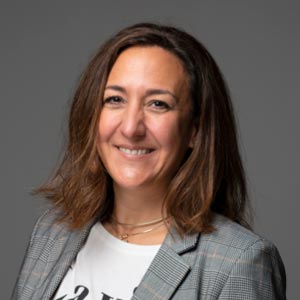 Gema Barón Dulce
Profesora de CRM, investigador del consumidor y reputación online
Professor of CRM, consumer researcher and online reputation
Doctora Cum Laude en Ciencias de la Comunicación por la Universidad Nebrija. Profesora Acreditada por ANECA. Licenciada en Publicidad por la misma Universidad, Máster Universitario en Dirección de Comunicación por la UCAM. Ha trabajado en diversas Agencias Multinacionales de Publicidad, Marketing Relacional y Marketing Directo, así como en anunciantes en España y Francia.
En el año 2010 se incorpora como profesora e investigadora en la Universidad Nebrija, impartiendo desde entonces diferentes asignaturas en el Grado de Publicidad y Grado en Marketing. Ha sido Coordinadora Académica del Máster Universitario en Marketing y Publicidad Digital Yahoo!, implementándolo en su lanzamiento en modalidad online (2012-2013) y Coordinadora Académica del Máster Universitario en Dirección de Publicidad Integrada TBWA (2014-2015 y 2015-2016). En la actualidad es la directora de programa del Grado en Marketing.
Gema Barón Dulce
Profesora de CRM, investigador del consumidor y reputación online
Professor of CRM, consumer researcher and online reputation
Doctora Cum Laude en Ciencias de la Comunicación por la Universidad Nebrija. Profesora Acreditada por ANECA. Licenciada en Publicidad por la misma Universidad, Máster Universitario en Dirección de Comunicación por la UCAM. Ha trabajado en diversas Agencias Multinacionales de Publicidad, Marketing Relacional y Marketing Directo, así como en anunciantes en España y Francia.
En el año 2010 se incorpora como profesora e investigadora en la Universidad Nebrija, impartiendo desde entonces diferentes asignaturas en el Grado de Publicidad y Grado en Marketing. Ha sido Coordinadora Académica del Máster Universitario en Marketing y Publicidad Digital Yahoo!, implementándolo en su lanzamiento en modalidad online (2012-2013) y Coordinadora Académica del Máster Universitario en Dirección de Publicidad Integrada TBWA (2014-2015 y 2015-2016). En la actualidad es la directora de programa del Grado en Marketing.
 Elena Borau Boira
Profesora de Social Media y Content Management
Professor of Social Media and Content Management
Doctora Cum Laude en Comunicación por la Universidad Complutense de Madrid con la Tesis Protocolo y Diplomacia a través de la prensa española (CAPII 2013). Profesora Acreditada por ANECA. Máster en Protocolo y Relaciones Externas en el ámbito Oficial, Empresarial, Cultural e Internacional por la Universidad Camilo José Cela (2008). Postgraduate in Journalism: News and Writting Reporting. Fordham University. New York, USA (2004). Licenciada Ciencias de la Información en Publicidad y Relaciones Públicas por la Universidad Complutense de Madrid (2002). Ha sido docente en diferentes universidades e instituciones como: Universidad Camilo José Cela, Universidad Internacional Menéndez Pelayo y Universitat de Lleida, así como en Next International Business School o en la Escuela Europea de Marketing y Empresa. Cuenta con una dilatada experiencia profesional en el campo de la consultoría de comunicación en empresas, asociaciones o agencias como Fundación Adecco, la Asociación Española de Protocolo, Estudio de Comunicación o BRIGDE, entre otras. Su principal línea de investigación es la comunicación, el protocolo, la diplomacia y la organización de eventos, y ha publicado en diversas revistas científicas de impacto así como en numerosos congresos científicos, nacionales e internacionales.
Elena Borau Boira
Profesora de Social Media y Content Management
Professor of Social Media and Content Management
Doctora Cum Laude en Comunicación por la Universidad Complutense de Madrid con la Tesis Protocolo y Diplomacia a través de la prensa española (CAPII 2013). Profesora Acreditada por ANECA. Máster en Protocolo y Relaciones Externas en el ámbito Oficial, Empresarial, Cultural e Internacional por la Universidad Camilo José Cela (2008). Postgraduate in Journalism: News and Writting Reporting. Fordham University. New York, USA (2004). Licenciada Ciencias de la Información en Publicidad y Relaciones Públicas por la Universidad Complutense de Madrid (2002). Ha sido docente en diferentes universidades e instituciones como: Universidad Camilo José Cela, Universidad Internacional Menéndez Pelayo y Universitat de Lleida, así como en Next International Business School o en la Escuela Europea de Marketing y Empresa. Cuenta con una dilatada experiencia profesional en el campo de la consultoría de comunicación en empresas, asociaciones o agencias como Fundación Adecco, la Asociación Española de Protocolo, Estudio de Comunicación o BRIGDE, entre otras. Su principal línea de investigación es la comunicación, el protocolo, la diplomacia y la organización de eventos, y ha publicado en diversas revistas científicas de impacto así como en numerosos congresos científicos, nacionales e internacionales.
 Jesús María Campos Bouzas
Profesor de Diseño y Creatividad Digital
Professor of Design and Digital Creativity
Licenciado en Publicidad y Relaciones Públicas. Cuenta con más de 20 años de experiencia como diseñador web. Especialista en UX, diseño y producción de contenidos digitales. Su trayectoria profesional arranca en antena 3 TV, para continuar en Marca.com y Quoco. Entre sus creaciones más destacadas, se encuentra la puesta en marcha, creación y diseño de la página web Marca.com, la web del Atlético de Madrid CF, el proyecto “Aprendemos juntos” de BBVA, o los distintos contenidos digitales de Vodafone. Creador del foro Domestika y docente de proyectos digitales en Universidad de Navarra y San Pablo CEU. Desde 2019, se encarga de la dirección estratégica y creativa de contenidos digitales, en Ymedia Wink.
En la Universidad Nebrija imparte la asignatura de Diseño web y aplicaciones móviles en el Grado en Comunicación Corporativa, Protocolo y Organización de Eventos y la asignatura de Diseño web en el Grado de Publicidad y Relaciones Públicas.
Jesús María Campos Bouzas
Profesor de Diseño y Creatividad Digital
Professor of Design and Digital Creativity
Licenciado en Publicidad y Relaciones Públicas. Cuenta con más de 20 años de experiencia como diseñador web. Especialista en UX, diseño y producción de contenidos digitales. Su trayectoria profesional arranca en antena 3 TV, para continuar en Marca.com y Quoco. Entre sus creaciones más destacadas, se encuentra la puesta en marcha, creación y diseño de la página web Marca.com, la web del Atlético de Madrid CF, el proyecto “Aprendemos juntos” de BBVA, o los distintos contenidos digitales de Vodafone. Creador del foro Domestika y docente de proyectos digitales en Universidad de Navarra y San Pablo CEU. Desde 2019, se encarga de la dirección estratégica y creativa de contenidos digitales, en Ymedia Wink.
En la Universidad Nebrija imparte la asignatura de Diseño web y aplicaciones móviles en el Grado en Comunicación Corporativa, Protocolo y Organización de Eventos y la asignatura de Diseño web en el Grado de Publicidad y Relaciones Públicas.
 Antonella Catucci
Profesora de Herramientas TIC
Professor of ICT Tools
Doctoranda en Estudios de Género en la UC3 de Madrid, es Licenciada en Comunicación e Idiomas para la Cooperación Internacional, con doble máster universitario en Comunicación Corporativa, Marketing Digital, Inbound Marketing y Comercio electrónico. Consultora Internacional de Marketing y Comunicación digital desde hace 10 años, durante su trayectoria, ha trabajado para Nespresso Italia en el proyecto SEO- On Page y para el Dusable Museum of African American History de Chicago como directora del proyecto en español, actualmente es docente en la Universidad Nebrija y en la UNIR; además es fundadora y directora de Own Value, agencia de marketing especializada en mujeres emprendedoras y Codirectora de Comunicación y Responsable de la sección MKT&Women en Marketing Insider Review.
Antonella Catucci
Profesora de Herramientas TIC
Professor of ICT Tools
Doctoranda en Estudios de Género en la UC3 de Madrid, es Licenciada en Comunicación e Idiomas para la Cooperación Internacional, con doble máster universitario en Comunicación Corporativa, Marketing Digital, Inbound Marketing y Comercio electrónico. Consultora Internacional de Marketing y Comunicación digital desde hace 10 años, durante su trayectoria, ha trabajado para Nespresso Italia en el proyecto SEO- On Page y para el Dusable Museum of African American History de Chicago como directora del proyecto en español, actualmente es docente en la Universidad Nebrija y en la UNIR; además es fundadora y directora de Own Value, agencia de marketing especializada en mujeres emprendedoras y Codirectora de Comunicación y Responsable de la sección MKT&Women en Marketing Insider Review.
 Raúl del Cuadro Rodríguez
Profesor de Webinario de Analítica en Medios Sociales
Professor of Social Media Analytics Webinar
Graduado en Publicidad y máster en Marketing y Publicidad Digital por la Universidad Nebrija. Adicionalmente, master en Brand Management por IED Madrid. Especializado en consultoría y estrategia de comunicación online trabajando junto a grandes marcas a lo largo de todo su customer journey. Ha trabajado a nivel nacional e internacional con clientes como Toyota, Decathlon, Spotify, Banco Santander, Coca-Cola European Partners, L’Oreal, Royal Caribbean, Acciona, Vantguard, Campo Viejo o Ron Santa Teresa, entre otros. Actualmente, Marketing & Communications Manager en la empresa tecnológica Softonic. Responsable de liderar a nivel global la estrategia de comunicación y marketing de Softonic, con el objetivo de impulsar la reputación de la empresa, tanto interna como externamente.
Raúl del Cuadro Rodríguez
Profesor de Webinario de Analítica en Medios Sociales
Professor of Social Media Analytics Webinar
Graduado en Publicidad y máster en Marketing y Publicidad Digital por la Universidad Nebrija. Adicionalmente, master en Brand Management por IED Madrid. Especializado en consultoría y estrategia de comunicación online trabajando junto a grandes marcas a lo largo de todo su customer journey. Ha trabajado a nivel nacional e internacional con clientes como Toyota, Decathlon, Spotify, Banco Santander, Coca-Cola European Partners, L’Oreal, Royal Caribbean, Acciona, Vantguard, Campo Viejo o Ron Santa Teresa, entre otros. Actualmente, Marketing & Communications Manager en la empresa tecnológica Softonic. Responsable de liderar a nivel global la estrategia de comunicación y marketing de Softonic, con el objetivo de impulsar la reputación de la empresa, tanto interna como externamente.
 Sergio García Cabezas
Profesor de Arquitectura Web
Professor of Web Architecture
Doctor en Educación ha compaginado su labor docente en el Centro Universitario La Salle, Universidad Francisco de Vitoria con su trayectoria profesional ha trabajado como CEO en Tranmediarte, Productor en Betterword o Director de contenidos transmedia en Possible Lab entre otros, esta labor profesional ha sido compaginada también con la de Consultor para grandes organizaciones en materia de tecnología, diseño, accesibilidad y narrativa transmedia unesco, OEI, RIINEE, Red Tucana, Gobierno de Chile entre otras. Entre su Proyectos web destacan https://labpossible.com; https://vestaliaasociados.es/; https://transmediarte.com/; https://betterworldgame.com/; https://makermania.es/; https://www.lasallecentrouniversitario.es/;https://mineacademy.es/;https://somosamafi.es/
Sergio García Cabezas
Profesor de Arquitectura Web
Professor of Web Architecture
Doctor en Educación ha compaginado su labor docente en el Centro Universitario La Salle, Universidad Francisco de Vitoria con su trayectoria profesional ha trabajado como CEO en Tranmediarte, Productor en Betterword o Director de contenidos transmedia en Possible Lab entre otros, esta labor profesional ha sido compaginada también con la de Consultor para grandes organizaciones en materia de tecnología, diseño, accesibilidad y narrativa transmedia unesco, OEI, RIINEE, Red Tucana, Gobierno de Chile entre otras. Entre su Proyectos web destacan https://labpossible.com; https://vestaliaasociados.es/; https://transmediarte.com/; https://betterworldgame.com/; https://makermania.es/; https://www.lasallecentrouniversitario.es/;https://mineacademy.es/;https://somosamafi.es/
 Sergio González Piñeiro
Profesor de Marketing de Afiliación
Professor of Affiliate Marketing
Licenciado en Publicidad y Relaciones Públicas por la Universidad Complutense de Madrid. Ha sido Director de Ecosistemas Digitales en Carat y Responsable del Product Office de Carat, desde donde ha desarrollado soluciones innovadoras de comunicación para los clientes de Carat, ha participado en liderar el conocimiento digital en Carat y participado en todos los planteamientos, desarrollos e Implementaciones de las herramientas que desarrolla Carat en España así como en la adaptación a España de los planteamientos y herramientas internacionales del grupo. Actualmente es socio fundador de ethink, compañía dedicada a la consultoría del comercio electrónico y el mundo digital.
Sergio González Piñeiro
Profesor de Marketing de Afiliación
Professor of Affiliate Marketing
Licenciado en Publicidad y Relaciones Públicas por la Universidad Complutense de Madrid. Ha sido Director de Ecosistemas Digitales en Carat y Responsable del Product Office de Carat, desde donde ha desarrollado soluciones innovadoras de comunicación para los clientes de Carat, ha participado en liderar el conocimiento digital en Carat y participado en todos los planteamientos, desarrollos e Implementaciones de las herramientas que desarrolla Carat en España así como en la adaptación a España de los planteamientos y herramientas internacionales del grupo. Actualmente es socio fundador de ethink, compañía dedicada a la consultoría del comercio electrónico y el mundo digital.
 Manuel Martín Esparza
Profesor de Medición y Analítica Web y Posicionamiento en buscadores SEO/SEM
Professor of Web Measurement and Analytics
Manuel Martín Esparza
Profesor de Medición y Analítica Web y Posicionamiento en buscadores SEO/SEM
Professor of Web Measurement and Analytics SEO / SEM search engine positioning Master en Business Administration (M.B.A.) por la University College Dublin, Licenciado en Ciencias Empresariales por la Universidad Autónoma de Madrid y Postgrado en Marketing y Ventas por la École de Commerce de Lyon.
Especialista en posicionamiento de pago (PPC), CEO en PanEuro Search Marketing.
Ha trabajado en Google, Amadeus, IE Business School, Unilever y Danone, entre otras.
 Alberto Martín García
Profesor de Social Media y Content Management
Professor of Social Media and Content Management
Doctor en Comunicación. Profesor Acreditado por ANECA. Licenciado en Publicidad y Relaciones Públicas por la Universidad de Valladolid. Tiene más de una década de experiencia como community manager de forma autónoma y es profesor asociado en el Campus María Zambrano en Segovia, de la Universidad de Valladolid, donde imparte las asignaturas de Estructura del sistema publicitario e ideas, métodos y estrategias creativas. Es escritor literario y su tercera novela 'El silencio de Raquel' (Caligrama,2018), fue galardonada con el Premio Talento Caligrama y reeditada en 2021 por Ediciones B, del grupo Penguin Random House.
Alberto Martín García
Profesor de Social Media y Content Management
Professor of Social Media and Content Management
Doctor en Comunicación. Profesor Acreditado por ANECA. Licenciado en Publicidad y Relaciones Públicas por la Universidad de Valladolid. Tiene más de una década de experiencia como community manager de forma autónoma y es profesor asociado en el Campus María Zambrano en Segovia, de la Universidad de Valladolid, donde imparte las asignaturas de Estructura del sistema publicitario e ideas, métodos y estrategias creativas. Es escritor literario y su tercera novela 'El silencio de Raquel' (Caligrama,2018), fue galardonada con el Premio Talento Caligrama y reeditada en 2021 por Ediciones B, del grupo Penguin Random House.
 Victoria Isabel Moreno Gil
Profesora
Professor
Doctora Cum Laude en Investigación en Medios de Comunicación por la Universidad Carlos III de Madrid, máster en Derecho de la información por la UNED y licenciada en Periodismo y Comunicación Audiovisual por la Universidad Carlos III de Madrid. Profesora asociada en la Universidad Nebrija desde 2019 y en la Universidad Carlos III de Madrid desde 2022. Sus líneas de investigación son la ética periodística, la desinformación, la alfabetización mediática y la Inteligencia Artificial. Combina su labor docente e investigadora con una dilatada carrera profesional como periodista (El Mundo TV, Intereconomía, Cadena Ser). Actualmente trabaja como redactora multimedia en la European Pressphoto Agency (EPA), ligada a la Agencia EFE.
Victoria Isabel Moreno Gil
Profesora
Professor
Doctora Cum Laude en Investigación en Medios de Comunicación por la Universidad Carlos III de Madrid, máster en Derecho de la información por la UNED y licenciada en Periodismo y Comunicación Audiovisual por la Universidad Carlos III de Madrid. Profesora asociada en la Universidad Nebrija desde 2019 y en la Universidad Carlos III de Madrid desde 2022. Sus líneas de investigación son la ética periodística, la desinformación, la alfabetización mediática y la Inteligencia Artificial. Combina su labor docente e investigadora con una dilatada carrera profesional como periodista (El Mundo TV, Intereconomía, Cadena Ser). Actualmente trabaja como redactora multimedia en la European Pressphoto Agency (EPA), ligada a la Agencia EFE.
 José Santiago Pérez Sotelo
Profesor de Arquitectura Web
Professor of Web Architecture
Doctor en Informática por la Universidad Rey Juan Carlos. Ingeniero en Sistemas de Información en la Universidad Tecnológica Nacional de Argentina (UTN), donde también se desempeñó como docente. Máster en Tecnologías de la Información y Sistemas Informáticos por la URJC. Ha realizado publicaciones en conferencias internacionales, workshops, revistas académicas y libros. Actualmente es miembro colaborador en el Centro para las Tecnologías Inteligentes de la Información y sus Aplicaciones (URJC) y Profesor consultor en la Universidad Isabel I. Se desempeña también como asesor y consultor particular en informática.
José Santiago Pérez Sotelo
Profesor de Arquitectura Web
Professor of Web Architecture
Doctor en Informática por la Universidad Rey Juan Carlos. Ingeniero en Sistemas de Información en la Universidad Tecnológica Nacional de Argentina (UTN), donde también se desempeñó como docente. Máster en Tecnologías de la Información y Sistemas Informáticos por la URJC. Ha realizado publicaciones en conferencias internacionales, workshops, revistas académicas y libros. Actualmente es miembro colaborador en el Centro para las Tecnologías Inteligentes de la Información y sus Aplicaciones (URJC) y Profesor consultor en la Universidad Isabel I. Se desempeña también como asesor y consultor particular en informática.
 Mª del Mar Ramos Rodríguez
Coordinadora de prácticas de la FCA
FCA Internship Coordinator
Doctora en Bellas Artes por la Universidad Complutense de Madrid. Licenciada en Ciencias de la Imagen y Sonido por la misma universidad. Su práctica profesional se ha desarrollado en el mundo de la fotografía, la producción audiovisual y el diseño gráfico y editorial. Destaca su experiencia laboral en el mundo de la publicidad cinematográfica, en estudios de diseño y en la productora cinematográfica CineCompany, así como en las empresas de comunicación editorial Grupo Zeta y Vocento. En la Universidad de Nebrija imparte docencia desde 1998 en programas de grado y postgrado en las áreas de Comunicación Audiovisual, Periodismo y Publicidad al tiempo que lo compagina con proyectos gráficos y audiovisuales para empresas e instituciones. Desde el año 2022 es la coordinadora académica de Prácticas de la Facultad de Comunicación y Artes.
Mª del Mar Ramos Rodríguez
Coordinadora de prácticas de la FCA
FCA Internship Coordinator
Doctora en Bellas Artes por la Universidad Complutense de Madrid. Licenciada en Ciencias de la Imagen y Sonido por la misma universidad. Su práctica profesional se ha desarrollado en el mundo de la fotografía, la producción audiovisual y el diseño gráfico y editorial. Destaca su experiencia laboral en el mundo de la publicidad cinematográfica, en estudios de diseño y en la productora cinematográfica CineCompany, así como en las empresas de comunicación editorial Grupo Zeta y Vocento. En la Universidad de Nebrija imparte docencia desde 1998 en programas de grado y postgrado en las áreas de Comunicación Audiovisual, Periodismo y Publicidad al tiempo que lo compagina con proyectos gráficos y audiovisuales para empresas e instituciones. Desde el año 2022 es la coordinadora académica de Prácticas de la Facultad de Comunicación y Artes.
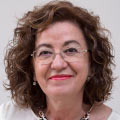 Juana Rubio Romero
Profesora de Trabajo de Fin de Máster
Professor of Master's Thesis
Profesora Doctora Acreditada. Licenciada en Psicología. Doctora en Filosofía. Profesora e investigadora en la Facultad de Comunicación y Artes desde 1996. Su especialización son los Métodos de Investigación y la Psicología aplicados a la comunicación y al consumo. Experiencia profesional en investigación social y de mercado. Ha ejercido en diversos puestos de responsabilidad como investigadora cualitativista para Institutos de Investigación, Agencias de Publicidad y clientes directos. Ha dirigido durante cinco años el Curso de Investigación en Marketing, que organiza AEDEMO. Ha participado en numerosos congresos nacionales e internaciones, como ponente y formando parte del comité organizador. Sus publicaciones más relevantes son documentos técnicos de investigación social.
Juana Rubio Romero
Profesora de Trabajo de Fin de Máster
Professor of Master's Thesis
Profesora Doctora Acreditada. Licenciada en Psicología. Doctora en Filosofía. Profesora e investigadora en la Facultad de Comunicación y Artes desde 1996. Su especialización son los Métodos de Investigación y la Psicología aplicados a la comunicación y al consumo. Experiencia profesional en investigación social y de mercado. Ha ejercido en diversos puestos de responsabilidad como investigadora cualitativista para Institutos de Investigación, Agencias de Publicidad y clientes directos. Ha dirigido durante cinco años el Curso de Investigación en Marketing, que organiza AEDEMO. Ha participado en numerosos congresos nacionales e internaciones, como ponente y formando parte del comité organizador. Sus publicaciones más relevantes son documentos técnicos de investigación social.
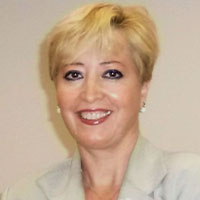 Beatriz Sanjurjo Rebollo
Profesora de Marco jurídico, regulación y ética profesional
Professor of Legal framework, regulation and professional ethics
Doctora cum laude en Derecho por la Universidad Autónoma de Madrid. Profesora Acreditada por ANECA. Licenciada en Derecho por la Universidad Autónoma de Madrid. Diploma de Especialización en Derecho Constitucional y Ciencias Políticas por el Centro de Estudios Políticos y Constitucionales. Diploma de Dirección de Personal y Recursos Humanos por la Escuela de Organización Industrial. Diploma de Dirección y Gestión Empresarial por la Universidad Politécnica de Madrid. Experta en Comercio Internacional por la Universidad Autónoma de Madrid. Académica correspondiente de la Real Academia de Jurisprudencia y Legislación. Abogada en ejercicio del Ilustre Colegio de Abogados de Madrid y Profesora de Derecho en Universidad Nebrija.
Beatriz Sanjurjo Rebollo
Profesora de Marco jurídico, regulación y ética profesional
Professor of Legal framework, regulation and professional ethics
Doctora cum laude en Derecho por la Universidad Autónoma de Madrid. Profesora Acreditada por ANECA. Licenciada en Derecho por la Universidad Autónoma de Madrid. Diploma de Especialización en Derecho Constitucional y Ciencias Políticas por el Centro de Estudios Políticos y Constitucionales. Diploma de Dirección de Personal y Recursos Humanos por la Escuela de Organización Industrial. Diploma de Dirección y Gestión Empresarial por la Universidad Politécnica de Madrid. Experta en Comercio Internacional por la Universidad Autónoma de Madrid. Académica correspondiente de la Real Academia de Jurisprudencia y Legislación. Abogada en ejercicio del Ilustre Colegio de Abogados de Madrid y Profesora de Derecho en Universidad Nebrija.
 Pavel Sidorenko Bautista
Profesor de Publicidad Digital
Professor of Digital Advertising
Profesor e Investigador en la Facultad de Comunicación y Empresa, y Programa de Doctorado en Humanidades y Sociedad Digital de la Universidad Internacional de La Rioja. Acreditado Contratado Doctor por ANECA con sexenio de investigación reconocido por la CNEAI. Doctor por la Facultad de Comunicación de la Universidad de Castilla-La Mancha. Es el director del Observatorio Académico Internacional de Comunicación, Marketing y Branding en el metaverso - 'Brandingverse' Ha centrado su investigación en las narrativas emergentes y nuevas tecnologías aplicadas a la comunicación digital. Actualmente suma más de 60 investigaciones publicadas en revistas científicas de alto impacto.
Pavel Sidorenko Bautista
Profesor de Publicidad Digital
Professor of Digital Advertising
Profesor e Investigador en la Facultad de Comunicación y Empresa, y Programa de Doctorado en Humanidades y Sociedad Digital de la Universidad Internacional de La Rioja. Acreditado Contratado Doctor por ANECA con sexenio de investigación reconocido por la CNEAI. Doctor por la Facultad de Comunicación de la Universidad de Castilla-La Mancha. Es el director del Observatorio Académico Internacional de Comunicación, Marketing y Branding en el metaverso - 'Brandingverse' Ha centrado su investigación en las narrativas emergentes y nuevas tecnologías aplicadas a la comunicación digital. Actualmente suma más de 60 investigaciones publicadas en revistas científicas de alto impacto.
 Ignacio Somalo Peciña
Profesor de Comercio Electrónico
Professor of E-commerce
Doctor en Economía Aplicada en la especialidad de eCommerce por la Universidad Rey Juan Carlos. Profesor Acreditado por ANECA. Licenciado en Ciencias Económicas por la UCM. MBA por el IE (Instituto de Empresa). Experto en Comercio Electrónico, es Chief Operating Officer de vdSHOP. Se desempeñó como director de para Europa de Alice.com, y ha sido responsable de portales de ecommerce como Casadellibro.com, Elarmariodelatele.com, Infoempleo.com y en Grupo Planeta. Ha fundado Projoven y Home 24X7. Presidente de la comisión de Tiendas Virtuales en Adigital, tiene además una gran experiencia en docencia y coordinación de programas de prestigio en importantes escuelas de postgrado como OBS, IE, IEB e ICEMD.
Ignacio Somalo Peciña
Profesor de Comercio Electrónico
Professor of E-commerce
Doctor en Economía Aplicada en la especialidad de eCommerce por la Universidad Rey Juan Carlos. Profesor Acreditado por ANECA. Licenciado en Ciencias Económicas por la UCM. MBA por el IE (Instituto de Empresa). Experto en Comercio Electrónico, es Chief Operating Officer de vdSHOP. Se desempeñó como director de para Europa de Alice.com, y ha sido responsable de portales de ecommerce como Casadellibro.com, Elarmariodelatele.com, Infoempleo.com y en Grupo Planeta. Ha fundado Projoven y Home 24X7. Presidente de la comisión de Tiendas Virtuales en Adigital, tiene además una gran experiencia en docencia y coordinación de programas de prestigio en importantes escuelas de postgrado como OBS, IE, IEB e ICEMD.
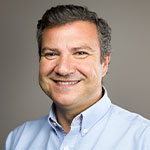 Fernando Toledano Cuervas-Mons
Profesor de Diseño y Creatividad Digital
Professor of Design and Digital Creativity
Doctor en Ciencias de la información por la Universidad Complutense de Madrid. Profesor Acreditado por ANECA. Master en Publicidad por ICADE (Universidad Comillas). Licenciado en Ciencias de la Información por la UCM, especialidad en Comunicación audiovisual. Ha trabajado en Gardoqui-Gold; Publicis y RdA Comunicación. Profesor en el Master Universitario en Dirección de Publicidad Integrada TBWA. Ha sido docente en el Curso de Creatividad Publicitaria y de la Comunicación del IED (Instituto Europeo di Design). Pertenece al Comité Ejecutivo del Capítulo Académico de la IAA (International Advertising Association). Actualmente es Coordinador académico de Grado en Publicidad y RR.PP., del Grado en Marketing y Comunicación Comercial y profesor permanente del la Facultad de Comunicación y Artes.
Fernando Toledano Cuervas-Mons
Profesor de Diseño y Creatividad Digital
Professor of Design and Digital Creativity
Doctor en Ciencias de la información por la Universidad Complutense de Madrid. Profesor Acreditado por ANECA. Master en Publicidad por ICADE (Universidad Comillas). Licenciado en Ciencias de la Información por la UCM, especialidad en Comunicación audiovisual. Ha trabajado en Gardoqui-Gold; Publicis y RdA Comunicación. Profesor en el Master Universitario en Dirección de Publicidad Integrada TBWA. Ha sido docente en el Curso de Creatividad Publicitaria y de la Comunicación del IED (Instituto Europeo di Design). Pertenece al Comité Ejecutivo del Capítulo Académico de la IAA (International Advertising Association). Actualmente es Coordinador académico de Grado en Publicidad y RR.PP., del Grado en Marketing y Comunicación Comercial y profesor permanente del la Facultad de Comunicación y Artes.
 Carolina Zamora Escribano
Profesora de Mobile Marketing y nuevas tendencias online
Professor of Mobile Marketing and new online trends
Doctora en Economía de la Empresa por la Universidad Rey Juan Carlos de Madrid, desarrolló la tesis doctoral La transmisión de valor de marca en entornos influenciados por las redes sociales: comportamiento del usuario y entendimiento para una nueva comunicación. Es Máster Oficial en Marketing en la Universidad Rey Juan Carlos y Licenciada en Filología Clásica por la Universidad Complutense de Madrid. En el área profesional trabaja como consultora de proyectos digitales en A04Media para empresas como ACNUR, Universia, etc. y dirige el área editorial, especializada en contenidos, content marketing y edición digital. Ha coordinado el desarrollo editorial de Observatorio eCommerce, STAS e Innovadoras TIC de la Fundación Cibervoluntarios. Ha participado en la organización del Social Mobile Congress, entre otros. Ha impartido clases de grado en UFV y de postgrado en ESIC Business & Marketing School; es miembro de Tribunales de TFM y Tutora en EAE Business School.
Carolina Zamora Escribano
Profesora de Mobile Marketing y nuevas tendencias online
Professor of Mobile Marketing and new online trends
Doctora en Economía de la Empresa por la Universidad Rey Juan Carlos de Madrid, desarrolló la tesis doctoral La transmisión de valor de marca en entornos influenciados por las redes sociales: comportamiento del usuario y entendimiento para una nueva comunicación. Es Máster Oficial en Marketing en la Universidad Rey Juan Carlos y Licenciada en Filología Clásica por la Universidad Complutense de Madrid. En el área profesional trabaja como consultora de proyectos digitales en A04Media para empresas como ACNUR, Universia, etc. y dirige el área editorial, especializada en contenidos, content marketing y edición digital. Ha coordinado el desarrollo editorial de Observatorio eCommerce, STAS e Innovadoras TIC de la Fundación Cibervoluntarios. Ha participado en la organización del Social Mobile Congress, entre otros. Ha impartido clases de grado en UFV y de postgrado en ESIC Business & Marketing School; es miembro de Tribunales de TFM y Tutora en EAE Business School.
More Academic Information
Official Degree:Master's Degree in Marketing and Digital Advertising
Graduates with analytical and strategic ability, with initiative and great work capacity, with the ability to empathize with a team, adaptable to organizational objectives, with a predisposition to make decisions regarding previous analysis, decisive and quick in the execution of their work and with interest in new technologies as users.
Professionals trained in the new profiles created after the growth of the Internet and digital environments, such as Digital Project Management or person in charge of web projects, Community Manager or expert in brand optimization, management and positioning in social media, Digital Planner and SEO Consultant. Professionals capable of defining and establishing marketing strategies, creating a corporate or sales website, implementing campaigns (communication, loyalty, promotion) and mastering the necessary analytical means to track and measure their effectiveness, passing through the control of all the resources offered by the Network for consumer knowledge and segmentation.
In the admission process, the academic record and their aptitudes will be assessed through a personal interview with the program coordinator.
60 ECTS credits.
Minimum 12 ECTS and maximum 60 ECTS per registration and academic period
 Accredited
Accredited Degree
Center responsible:School of Communication and Arts
Branch of knowledge: Social and Legal Sciences
Available places: 150
Type of Education: Online
Academic year in which it was implemented: 2011
Languages: Spanish / English
Duration: 1 year
University Services: [+info]
Competences
Specific competences- Possess, understand and know how to apply the advanced concepts of marketing and commerce through the Internet and new technologies, and its connection with the company's global marketing strategies.
- Know, understand and know how to professionally apply the way in which relations with consumers take place in the interactive digital environment, as well as the potential of the Internet as a source of information and knowledge about the consumer.
- Possess, understand and know how to apply the advanced concepts of affiliate marketing, the business model they represent and the possible strategic approaches to operate in this medium.
- Possess, understand and correctly apply advanced knowledge on the elements that intervene in the purchase / sale of goods and services through the Internet and new digital technologies.
- Understand and know how to apply the principles and approaches of construction / branding strategies and branding in the online environment.
- Acquire and demonstrate having a strategic mentality in order to apply it to the selection of digital media, knowing how to design the strategy, selecting agents and interpreting and developing online media plans.
- Possess, understand and know how to apply the advanced concepts of digital advertising and know how to implement online advertising actions based on objectives and strategies.
- Possess, understand and know how to apply SEO and SEM concepts and techniques for online positioning.
- Understand and know how to apply advanced concepts about social media marketing techniques and the creation of links with the consumer.
- Understand and know how to apply the latest trends in the brand-consumer relationship through marketing on mobile devices and new emerging media.
- Know how to implement, communicate and effectively present the strategy and marketing campaign and digital advertising.
- Master’s Degree in Marketing and Digital Advertising Accredited Master’s Degree Reserve a place.
- Know and be able to apply correctly the specialized concepts about web design and architecture oriented to marketing and digital commercial communication.
- Know the main variables of measurement of results in the online environment and be able to effectively use the tools available in the medium.
- Possess, understand and know how to apply knowledge about the commercial research methods specific to the online medium, applying both quantitative and qualitative research techniques.
- Know and understand the possibilities offered by new technologies, especially web 2.0 and 3.0 as a means of relating to and learning from the consumer.
- Know and understand the specific foundations of the legal system, the regulatory framework and professional ethics in the online environment.
- Possess, understand and know how to apply the fundamental and advanced concepts and techniques of social communication research, both from a scientific perspective and from its application to business projects.
- Know how to plan and implement a comprehensive digital communication plan.
- Know how to communicate and present the topics related to their specific areas of knowledge in professional, academic, scientific and general society environments.
- Apply the knowledge acquired in the context of organizations and companies, as well as especially in the field of commercial communication and the digital environment.
- Solve problems and make effective decisions when faced with problems and situations of a high competitive level.
- Integrate the knowledge acquired and face the complexity of making judgments based on information that, being incomplete or limited, includes reflections on social, economic and ethical aspects.
- Communicate the conclusions and the knowledge and ultimate reasons that support them in a clear and effective way to both specialized and non-specialized publics.
- Possess the learning skills that allow them to continue studying in a way that will have to be largely self-directed or autonomous, in order to be above the technological challenges.
- Possess the learning skills that allow them to start an academic career in the area of knowledge of Communication and Arts, after having developed a professional career for one year, if that is their desire.
- Demonstrate that they know how to work effectively in a team.
- Demonstrate great sensitivity in the development of their professional and / or academic work, in compliance with current regulations at both Spanish and European level, codes of good practice, self-control criteria, promotion of women's equality, of disabled people, the protection of children and, in general, the principles contained in the Spanish Constitution and the values of the Culture of Peace.
- Demonstrate having acquired the general and specific competencies of the program.
- Apply in practice the knowledge acquired in the program during the development of the professional activity.
Online Study
MethodologyThe teaching system will be carried out entirely through the Virtual Campus, accessible from the Internet through the remote computer platform currently in use at the University.
Nebrija Platforms
Access to the Virtual Campus
At the beginning of the course, the student is given, via online (email and downloadable material from the website), the general documentation of the Master's Degree that will include:
- Information for all subjects.
- General agenda.
- List of professors.
- General teaching methodology.
- Description of the type of documents that are published.
- Basic contact information, telephone numbers, e-mail addresses, telephone service hours, etc.
Along with this general documentation and also electronically, the student will be provided with a didactic guide for each subject, which includes:
- Detailed program of the subject and the competencies the student will achieve when finished.
- Detailed set of learning activities, papers to be submitted, grading criteria in the ordinary and extraordinary examination session, bibliography and recommended links.
- Location and detailed mechanisms of online/pone tutoring with the professor.
- Exam dates, paper submission dates.
- Any other information and necessary orientation in order to follow the subject.
This material will be accessible at all times through the Virtual Campus, whose main page has all the subjects in which the student is enrolled, organized by semester.
Each subject is coordinated by a tutor, who is responsible for setting the educational itineraries and providing students, through the Virtual Campus, all the necessary material to take the course.
Each subject's Virtual Campus is organized in a structure of folders for communication, documentation, notices, etc. of the educational e-learning projects. The platform also offers a series of essential tools for online learning, such as forums, videoconferencing, the submission of papers, and the repositories of documents for the dissemination of notes among students. Additionally, it incorporates tools such as surveys and exercises that allow interaction with the students to see their progress level in the subject.
The teaching of the subjects is structured into educational itineraries, which are learning sequences programmed by the tutor according to the contents of the subject, dividing it into modules (chapters) and stages. The educational itinerary not only includes documents, but can also include any of the tools offered by the Virtual Campus platform, so that the elements of the itinerary can be exercises, group work, participation in forums, surveys or any other element of the campus.
The tutor controls the progress of the students, knowing at all times what documents they have read and how much time they have devoted to it, being able to establish -for example- mandatory milestones, so that if the student has not passed a test, he/she cannot access the rest of the formative itinerary.
In addition to the material available on the campus, group tutoring will be scheduled on a regular basis and on previously set days, and be carried out through videoconferencing and webinar systems. Teachers are permanently accessible by email with a maximum delay of 48 hours. They will also be available for telephone assistance on the schedules and days previously set for each subject.
The publication of documentation is distributed throughout the course, in several deliveries corresponding to the various modules and stages of learning, so that the student assimilates the subject matter gradually. Each of these publications of teaching material will be composed of various types of documents:
- Theoretical contents of the subject. Each didactic unit (module or stage) explains a complete unit of the subject. Its content, in great extension and depth, includes complementary information on concepts, definitions, bibliography and web links of interest.
- Exams and follow-up tests. The results will be published on the platform.
- Exercises and proposed work that the student must complete and deliver to the professor by electronically and he/she will correct and evaluate them. The work deals with the contents of the subject and its application to problems, examples and case studies.
Upon the publication of each documentation, the tutor will inform the students of the deadline for submission of each of the exercises and proposed work, which will normally be three or four weeks after the publication of the corresponding contents.
Course evaluation system:
Although the evaluation system may vary depending on the particular characteristics of each subject, in general, the evaluation system is structured around the following elements:
- Participation in forums and other activities programmed through the virtual campus.
- Follow-up tests.
- Practical tests or evaluation work.
- Final in-person exam or project (not in-person).
The final exams of each subject can consist of both an exam and the presentation of a project submitted by telematic means.
In the final grade of the subject, the grade of said final exam is weighted with the rest of the evaluation elements as indicated in the Learning Guide of each subject.
The specific percentages of weighting in each subject appear in the documentation delivered to the student at the beginning of the course.
All grades will be accessible via Internet, in the student's private section.
Evaluation system of the Master's Degree Final Research Project:
The Master’s degree Final Research Project consists in the creation of a digital marketing plan that must be defended via telepresence before a Tribunal.
Said Tribunal will be made up of professors of the Master's degree and relevant professionals of the sector.
The reading and defense of the Final Master's degree project will take place in July or September, depending on the period of completion of the internship and can only be done once the rest of the subjects of the Curriculum have been passed.
The evaluation will consider both the individual work, embodied in the written and audiovisual document containing the proposal (80% of the final grade), and the oral presentation before the Tribunal (20% of the final grade).
Academic calendar
Academic Calendar 2023-24 Academic Calendar 2024-25 Academic Calendar starting in March 2025Schedules
Access and admission
4.2. Access and Admision
As established in article 16 and 17 of RD 1393/2007 of October 29, which establishes the organization of official university studies, in order to access the official master's degree studies one must have an official Spanish university degree or another issued by an institution of higher education of the European Higher Education Area that grants access to Master's degrees in the country issuing said degree.
Likewise, according to the aforementioned article, access will also be granted to graduates of educational systems outside the European Higher Education Area, without the need for homologation of their degrees, after verification by the University that they accredit a level of education equivalent to the corresponding official Spanish university degrees, and that they grant access to postgraduate studies in the country issuing the degrees. Access by this means will not imply, in any case, the homologation of the interested party's previous degree, nor its recognition for other purposes than that of studying the Master's degree.
For this Master's Degree, the Bachelor's Degree or Undergraduate Degree in Advertising and Public Relations, Bachelor's Degree in Business Administration and Management, Bachelor's Degree in Journalism and Bachelor's Degree in Audiovisual Communication will be especially valued.
The admission process to the Master's degree begins by sending the following documentation by post or courier to the Postgraduate Admissions Section:
- Completed Admission Application
- Updated Curriculum Vitae
- Photocopy of the DNI (only Spanish candidates) or passport (only foreign candidates)
- Photocopy of the Academic Record/Transcript (complete or in the last year studied of the university degree)
- Four color passport-size photographs
- Document that proves the candidate has an Intermediate Level in English (for Spanish speakers) or Spanish (for non-Spanish speakers)
Once the documentation has been received and it has been verified that the submitted degree grants access to the Master's degree, as established in arts. 15 and 16 of Royal Decree 1393/2007, the candidates take the proficiency test of their chosen program.
The tests are taken remotely, and consist of an aptitude test with which assess the student's maturity and the reasons that lead him/her to study here, and a specific test for the chosen program. The Admissions Commission analyzes the results and the documentation submitted by the candidate and approves or rejects the application. The candidate receives written information about their admission, about the process of formalizing their enrollment in the Program and about the final documentation that must be submitted, duly legalized.
Also, the Admissions Commission, made up of those responsible for the Department itself, the Registrar's Office and the Department of University Development, is responsible for proposing to the University Rector the granting of student status for those candidates whose suitability has been verified.
The weighting of these admission tests is specified below:
- Academic Record of previous studies: 50%
- Aptitude test: 20%
- Admission test to the master's program: 30%
After registering, the candidate goes on to formalize their enrollment, choosing the subjects online and completing the required information.
Throughout the process, the candidate is permanently in contact with the Department of University Development and with the academic heads of the Program, who can answer any questions.
Employability
Career Opportunities
The teaching staff of the School of Communication and Arts is formed by professionals from each field of specialization, who carry out a teaching method based on the conviction that what we learn, we learn by doing it.
The integration with the profession is based on the incorporation of professionals as associate professors in each program, in a teaching methodology inspired by the learning by doing proposal which carries over into the experiential aspect in the classrooms and into the activities of academic extension.
The program trains students to pursue professions such as
Internships
Nebrija University has signed a Collaboration Agreement on training practices and employment with nearly 3,000 companies and institutions, to promote practical training for all its students and the approach to the professional environment and first job of university graduates.
These are some of the companies that students of the Master's Degree in Marketing and Digital Advertising can opt for in order to carry out their internships and come fully into contact with the professional field:
- ACCENTURE
- AKROLIH TU GUÍA ONLINE S.L.
- ALCEDO ATTHIS SLU
- ARAJET,S.A.
- ARTEMAN KOMUNIKAZIOA KOOP
- AXA COLPATRIA SEGUROS DE VIDA S.A.
- BANCA MARCH, S.A.
- BPL MEDICAL
- CASA EARLY LEARNING
- CG3 GROUP CENTRAL SANTANDER
- COMERCIALIZADORA PUBLICITARIA AVANZADA
- COMISIÓN NACIONAL DE ENERGÍA_REPÚBLICA DOMINICANA
- CONSULTORIO DENTAL VIDENTAL
- CREA MÁS PERÚ
- DIA RETAIL ESPAÑA S.A.U.
- ECOCERAMIC, S.L.U.
- GLT LOGISTICS
- ING BANK
- KIMOON SL
- L. GESTION PROACTIVA III, SRL
- EUROPA PRESS COMUNICACIÓN, S.A
- ARCO ESTRATEGIAS S.L
- PLANNER MEDIA
- PRISA NOTICIAS S.L
- SONY MUSIC ENTERTAINMENT SPAIN S.A
- THEMA CONTENTS S.L. (ZELEB)
- VICE IBERIA MEDIA GROUP S.L
- IBERDROLA ESPAÑA, S.A.U.
- IPSUM PLANET S.L
- AYUNTAMIENTO DE BEJÍS
- BENEMÉRITO CUERPO DE BOMBEROS DE GUAYAQUIL
- COMANDO CONJUNTO ESTRATÉGICO DE COMUNICACIÓN
- SEGURO NACIONAL DE SALUD
- SINDICATO DE EMPLEADOS PUBLICOS DEL SERVICIO NACIONAL DE APRENDIZAJE SENA
- ASESORÍA Y GESTIÓN INTEGRAL FORMATIVA S.L
- NBS ESPAÑA
- STUDIO 128K
- UNIVERSIDAD NEBRIJA
- VIVO IDIOMAS
- SEATRA, S.L.
- RENAULT ARGENTINA S.A.
- CENTRO COLOMBO AMERICANO PEREIRA CARTAGO
- CULTURELAB TS
- GESTIÓN EDUCATIVA CONSULTORES, S.L.
- ICE INSTITUTO DE COMUNICACIÓN ESPECIALIZADA AC
- MENTE CAPAZ COACHING Y FORMACIÓN
- ORTOFACE
- CASA RURAL HIDALGO
- ETIQUETAS ADHESIVAS DEL MEDITERRÁNEO S.L
- GRUPO DIBAQ
- FARMACIA CARAZO FRANQUESA, CB
- GALDERMA COLOMBIA SA
- HABITUM HOGAR, S.L.
- HOYA LENS IBERIA SAU
- LILICOM S.L
- MADRIDEAS Y GESTIÓN ALQUILER S.L.U.
- WOODENDOT
- REGALO ORIGINAL GLOBAL S.L
- VIZARO
- MÁS QUE UN CARAMELO C&CH S.L
- OIU NOVIAS
- MERAKI DENTAL
- VIAJES DE AUTOR S.L.
- SITELICON WEB PROJECTS, S.L.
- SYNEIDIS S.L
- SUPER ROBOTICS
- GRUPO CREATIVO
- GEOLAB CVL
- ACCUTONE EUROPE S.L.
- LLORENTE & CUENCA REPUTACION Y DEPORTE, S.L.
- MARCO DE COMUNICACIÓN S.L.U.
- DODEPECHO DISEÑO Y COMUNICACIÓN, S.L.
- I2C INTERNET, S.L. ( LIN3S AGENCIA DIGITAL)
- MOVIEPRESS TV RADIO
- SOCIAL NOISE
- SMART CLIENT, S.L.
- SEB CREATIVOS S. COOP AND
- HAVAS WORLDWIDE SPAIN, S.A.
- MINDSHARE SPAIN, S.A
- OPTIMUM MEDIA DIRECTION (OMD)
- ORION SOUTHER EUROPE, S.A.
- PUBLICITARIA GENNERA
- TEQUILA SPAIN, S.L.
- RECREA BRANDING MADRID
- ATREVIA COMUNICACIÓN S.L.U
- B2B GROUP S.A
- BANNISTER GLOBAL, S.L.
- ECOMMERCE 2 GESTIÓN GLOBAL, S.L.
- GEOTELECOM SL
- MARAK DIGITAL MARKETING
- MERKAT PUBLICIDAD
- MRM WORLDWIDE SPAIN, S.A.
- POLAR MARKETING SOLUTIONS S.L
- CARAT ESPAÑA , S.A.U.
- EL CUARTEL CREATIVO, S.L.
- GLASS OF IDEAS
- LA TORRE WALLACE S.L.
- WIDITEK TECHNOLOGY, S.L
- THE DIGITAL GATE S.L
- BOUNSEL S.L.
- DATA SOLUTIONS
- DIELMO3D S.L.
- BDO AUDITORES S.L.P
- WECOLLECT ADVISORY SL
- GF-TIC, S.L.U.
- INTERNATIONAL VENTURE CONSULTANS IVC OUTSOURCING AV, SL
- IMAGINE 800, S.L.
- ARKIX, S.A.S.
- AZC GLOBAL E INTEGRAL DE COMUNICACIÓN Y GESTIÓN S.L.
- ATRES ADVERTISING, S.L.U.
University Life in Marketing y Publicidad Digital
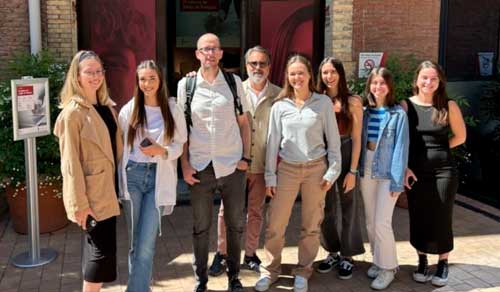
Masterclass by Juan Cenoz, creative director of the VCCP agency
The creative director of the multinational agency presented to our Bachelor's students the advertising and branding success story of O2, Telefónica group's brand, for which he is responsible at VCCP [Read more]
Target Senior: Oportunidad de oro
En colaboración con la Silver Academy de PresidenteX, esta iniciativa pretende formar a nuestros estudiantes sobre el Target Senior (consumidores a partir de 55 años), el que más crece en número y que concentra el mayor poder de compra.
- Fecha: Lunes 13 de noviembre
- Lugar: Salón de actos del Campus de Princesa - Universidad Nebrija (presencial)
- Hora: 09:30 a 11:00 horas
XX Touched
Once again, the students of Nebrija University award the best campaigns of the year, for excellence and recognition to the most outstanding protagonists of the sector, in an edition that was attended by Luis Bassat, Toni Segarra and Concha Wert.
Nebrija Event Awards
Los alumnos del Grado en Comunicación Corporativa, Protocolo y Organización de Eventos organizan un año más Nebrija Event Awards. Un punto de encuentro entre los profesionales del sector y el futuro en la organización de eventos.
Investiture ceremony of Toni Segarra as Doctor Honoris Causa
At the proposal of the School of Communication and Arts, Nebrija University has invested publicist Toni Segarra as Doctor Honoris Causa. Considered one of the best copywriters of his generation, the author of mythical slogans such as “¿Te gusta conducir?” (Do you like to drive?) and “Bienvenido a la República Independiente de tu casa” (Welcome to the Independent Republic of your home), he was honored for his vital contribution to advertising language.

